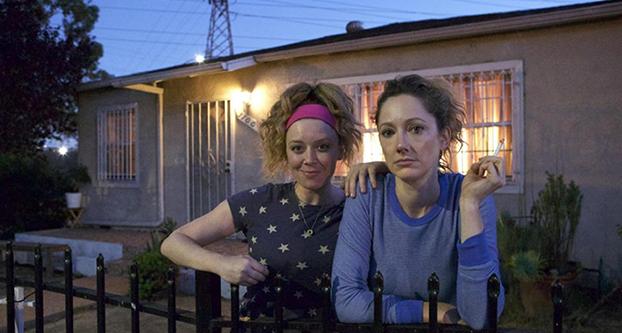While Judy Greer gives a wonderful and believable portrayal of sex addict Shannon, this dark comedy leaves much to be desired. Having left rehab to stay with her sister Martha (Natasha Lyonne, “Orange is the New Black”) in Fresno, the duo find work at a hotel, and quickly run into trouble, specifically being blackmailed for $25,000. Don’t ask how, it happened so fast you barely had time to adjust to the last seemingly random plot change.
If you want to write about Fresno, we ask that you accurately represent the city. For a film that includes Fresno in the title, this film is — shocker — not about Fresno. Almost none of the scenes take place in the city, with only one icon (Downtown “Welcome to Fresno” sign) being showcased. It also flops on representing some of the key issues and cultures that actually occur in the Central Valley as a whole.
The characters somehow end up at a bar mitzvah, when, let’s face it, in Fresno you are more likely to run into a quinceañera. The movie seems to totally avoid the large Latino population that is integral to our community, making the film seem slightly ethnocentric. Fresno has a very diverse population, but no one would know that if all they knew about Fresno came from this movie.
For a brief moment a character tells us that he wrote a poem about Fresno. This was the chance to give some depth to Fresno, considering the rich history of poetry that has been nationally recognized here, resulting in two national poet laureates being from Fresno.
Alas, the poem was about how hot and miserable it is in Fresno. We get it. It is hot in Fresno. Get over it.
The multiple subplots of the movie only make for a confusing comedy. There are at least six different subplots occurring under the larger branch of blackmail. Not enough attention was paid to any of them to be fully explored. “Addicted to Fresno” was a disjunction of unfinished stories that are left unresolved at the end, stealing that sigh of contentment that we all love when the lights fade to black.
“Addicted to Fresno” was more like “addicted to stereotypical complaints about any misunderstood city.” Had you replaced Fresno with any other city name, the film’s central story would still be as applicable.
That is because it’s not about Fresno; it is about sisterhood and addiction. Placing the serious story within a city like Fresno was an attempt to make the movie funny. It is in the cheap laughs of self-deprecation that we can find this movie slightly comedic. If you take out all the cheap shots at Fresno and the bad sex jokes, you might be left with an interesting story about two sisters trying to make sense of their lives while caught in the midst of addiction and desperation.
The redeeming quality of this film was the very real idea of addiction and the difficulty of accepting your flaws. Fortunately, it also does not have a stereotypical happy ending; it was a realistic finish while still touching. Had the rest of the movie been written with the same genuine feeling, its rating would be much higher. This idea would have been more fluid had it been pursued as a serious drama rather than a dark comedy.





SnakePlissken • Feb 24, 2017 at 8:57 pm
You took the movie too seriously. I think the original story takes place in Cleveland, but it was actually cheaper for Hollywood to film in Fresno, because, well.. Fresno.